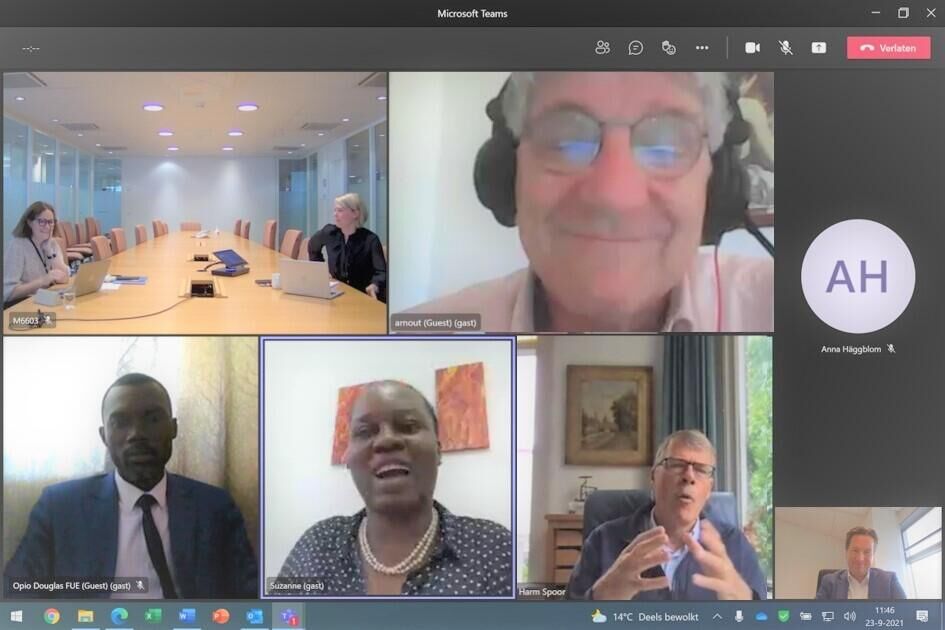

DECP, PUM and NHO DEVELOP STRATEGY GUIDE ON DIGITALISATION FOR EMPLOYERS’ ORGANISATIONS
DECP, PUM and NHO joined forces to develop a strategy guide on digitalisation for East African employers’ organisations. During a special online meeting, the guide was presented by the author and Digitalisation & IT expert Harm Spoor to the CEO’s of the Ugandan and Tanzanian employers’ organisations. The publication was well received by the CEO’s: “this work is timely, useful and strategic”.

Together with PUM, Netherlands Senior Experts and the Norwegian counterpart of DECP, the International Cooperation Programme of the Norwegian employers confederation NHO, DECP developed a guide to enhance a strategic approach to digitalisation in employers federations in East Africa. The guide was presented in a special online meeting to the Executive Directors of the employers’ organisations in Uganda and Tanzania. The guide can obviously be used in many more countries because the advice and guidance is of a more universal nature. It tackles the major strategic issues linked to the introduction of digitalisation in any employers organisation.
Digitilisation is a major challenge for employers organisations. This was already a certain point of attention before the Covid crisis. But Covid brought almost everywhere prohibitions for close human contact, exacerbating the need for online services. The need for digital approaches was hence accelerated also in employers organisations, in almost all activities and services, such as training delivery, advice to companies and meetings. Digitalisation became suddenly a hot and urgent topic.
The new situation gave rise to many questions, some of a practical nature, but many also of a more strategic nature. How to deal with it, to avoid also that short term actions mortgage the longer term perspective? How to develop it with limited resources? Which investments and which processes to follow? Which objectives and priorities to achieve in digitalisation? In short, a serious need on guidance and strategic advice.
This knowledge need was common to all DECP’s East African partners, and both felt by NHO, active in the region, and DECP. Thanks to the well established contacts with PUM, a tripartite DECP-NHO-PUM team was established. In this team knowledge on the digitalisation issues was combined with the knowledge on employers’ organisations functioning. It worked under the excellent leadership of the PUM IT sector coordinator and expert Harm Spoor. The team arrived now to publish this short guidance document for leadership on future digitalisation strategies in employers’ organisations.
Whilst having started from the situation and the needs in the East African employers organisations, the approaches and solutions it suggests are for sure very useful as a general guidance for all employers’ and similar service oriented organisations over the world, which face the same strategic questions.
The publication tackles the main issues at a high level and in a concise matter.
First theme: why is digitalisation important and where does it affect employers organisations activities, functions and output. During the meeting Harm Spoor emphasized that digitalisation is not only a technical issue. It is primarily a strategic issue and organisations should approach digitalisation by asking ‘how can we help our customers online in an even better way’. Senior management owns the strategy process and should show leadership in this respect. Second theme: how profoundly is our industry and business changing? Should we ‘enhance’, ‘shift’ or even ‘transform’ the actual business model and way of working? Third theme: what essential conditions need to be in place to start a meaningful and effective journey towards digitalisation. Here the focus is on the need to have some basic systems, IT staffing, equipment, budgets and culture; the main message here: make sure you can start an effective strategy process and are able to execute your plans. Fourth theme: what are essential elements upon which to build a strategy as employers’ organisations to further successfully digitalise, with a focus on baseline of the actual (IT) situation, information on markets and clients and a clear business strategy. And finally, what are the possible growth paths in digitalisation, in the booklet a four stages model is presented, but every organization must make it’s own choices based on circumstances, ambitions and possibilities. Ultimately strategy and roadmap are just a plan for feasible execution.
The publication itself is compact and brief, but contains many references for further reading. It is hence a document targeting leadership of employers’ organisations, but can also be used as a reference tool for staff members who want to explore the theme of digitalisation deeper.
During the presentation meeting of the guidance booklet, the executive directors of the employers’ organisations ATE (Tanzania) and FUE (Uganda) reacted very positively. ATE CEO Mrs Suzanne Ndombo said: “Digital is the agenda; this work is timely, useful and strategic”. FUE CEO Mr Douglas Opio called it “an eyeopener, very useful to guide us in the further steps to digitalization and to implement them with vision and in a planned and orderly way”. Both CEO’s recommend the guide as a useful tool in the digitalisation journey of employers’ organisations.
The guidance note is available at the DECP website. Click here to open: Report digitalisation